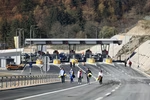Media or political project: Telekom Srbija launches news TV channel in Bosnia and Herzegovina

Telekom Srbija continues its expansion throughout Bosnia and Herzegovina, and this time they are entering the market with the Euronews TV project. According to the currently available information, they are planning an office in Sarajevo and Banja Luka. But the main question is - is Euronews in Bosnia and Herzegovina a media or a political project?
Euronews in Serbia was launched a few years ago, and its 100% owner is Telekom Srbija, a company owned by the Serbian state. According to Politico's research, as well as investigations conducted by Hungarian, French and Portuguese media, the owner of the European informational television station Euronews is closely connected with Hungarian Prime Minister Viktor Orbán.
Officially, Alpac Capital investment fund, based in Portugal, bought the majority of Euronews in July 2022, for some € 170 million, but at least a third of the funds came from sources connected to Viktor Orban, a research conducted by Direkt36, Le Monde and Expresso showed.
At the beginning of March this year, the director of Telekom Srbija, Vladimir Lucic, announced that they are planning Euronews in Bosnia and Herzegovina, but also in Montenegro.
"We are expanding our cooperation with Euronews, the largest European media network, so that after Serbia we are moving to Bosnia and Herzegovina and Montenegro," Lucic told Happy TV.
The fact that Telekom Srbija is entering the market of Bosnia and Herzegovina with Euronews is also confirmed by the recently published employment ads with the sentence:
"Euronews opens its doors in Bosnia and Herzegovina as a new international TV project and begins preparations for the opening of its office in Bosnia and Herzegovina - Sarajevo and Banja Luka. Euronews is an information channel and it will soon arrive in Bosnia and Herzegovina."
The media market expansion in Bosnia and Herzegovina could be viewed positively. Still, in this case, the project of starting an information channel is also viewed through a political prism, especially knowing that the BiH media market is proportional to the size of the country. There is not much room for large earnings.
"The arrival of Euronews in Bosnia and Herzegovina through Telekom's ownership can definitely be seen as a media and political project, i.e. as a platform for spreading a certain media and political influence on the part of Serbia, if needed. At the very least, it is a business project that would bring some kind of profit to Telekom. The media in the Balkans is still not a business as much as a tool of political influence," Marija Vucic, a journalist from the Raskrinkavanje portal in Serbia, told N1.
The arrival of media owned by other countries, which is also associated with Orban, who is on the list of enemies of media freedom, also causes concern about the possibility of threatening media freedom in Bosnia and Herzegovina, especially taking into account that BiH was placed 81 on the media freedom index of Reporters Without Borders, this year, and last year it was in the 64th place.
"Disregarding the connection with Orban, we already have enough reasons to ask about the possibility of compromising media freedom, since it is a media that is essentially owned by the state, specifically the state of Serbia. Hypothetically speaking, there’s always a chance that such a media will be harnessed to serve the interests of the government and not the public, if and when needed," journalist Vucic said.
The media market in Bosnia and Herzegovina is unregulated, complex and complicated, and the space for the media to be used as a tool in the hands of politicians has long been wide open and dangerous. However, external political influence through media on some unstable political and security situations in the country is becoming even more dangerous.
N1 also sent an inquiry to the Euronews head office in France regarding the launch of the media project in Bosnia and Herzegovina, but the answer had not arrived by the time the text was published.
Kakvo je tvoje mišljenje o ovome?
Učestvuj u diskusiji ili pročitaj komentare





 Srbija
Srbija
 Hrvatska
Hrvatska
 Slovenija
Slovenija


























































